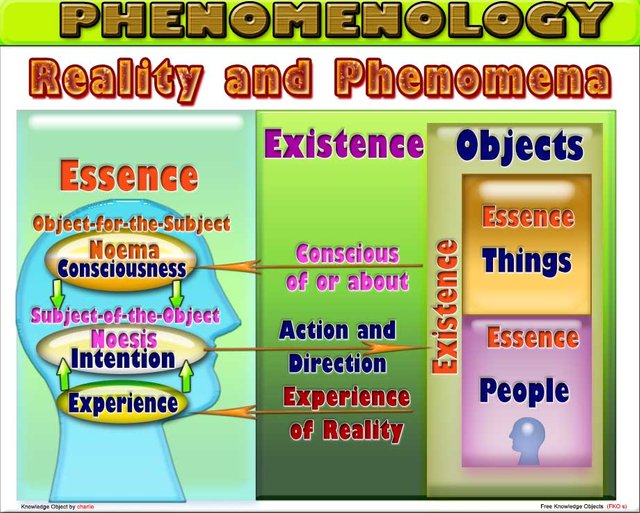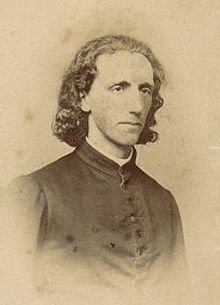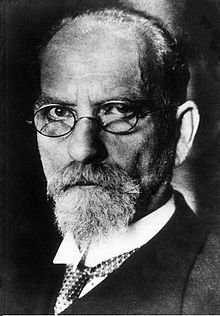Part 2 - The Short History of Existentialism: III - Phenomenology - Brentano to Husserl
The Dialectics of Liberation: Anarchism, Existentialism, and Decentralism.
Part 2 - The Short History of Existentialism: III - Phenomenology - Brentano to Husserl
"Existence is our Destiny, and Death our Fate." - charlie777pt
1- Introduction
“Death is not an evil, because it frees us from all evils, and while it takes away good things, it takes away also the desire for them. Old age is the supreme evil, because it deprives us of all pleasures, leaving us only the appetite for them, and it brings with it all sufferings. Nevertheless, we fear death, and we desire old age.” - Giacomo Leopardi
The precursors of existentialist philosophers were anticipating the need for new approaches for reality and new values for the modern man of industrial society, and created the pillars for the new philosophical entity centered in the inner search for the individuality, freedom of choice, to establish new paths for life.
They were philosophers of freedom and the main root for existentialism, claiming for the individual choice and responsibility, to create our Destiny, except that our lives end in death, a human condition that works like an inevitable Fate.
" Life is hard. After all, it kills you." - Katharine Hepburn
One of the most important things they understood, was that man in above any constraints of any moral, political or religious system that can be an obstacle to our free will.
Existentialism, like Anarchism and Decentralism, considers that individuals have the primacy over any system, political regimen and moral or religious impositions on personal behavior.
We have an Essence growing by Existence as Destiny, and the experience of Death as the Fate of human finitude that is out of control, and we should eliminate the fear of Gods.
Some transcendental existentialists add to the Fate of Death, the Transcendence of God(s), that is used to avoid facing that we are mortal, to think that our actions are guilt-free, and when the Essence recognize mistakes, it can be solve it by repent to expiate the sins by forgiveness, instead of learning that errors can't be corrected by guilt (that most of the time religious people attribute to others outside).
"Better to reign in Hell than serve in Heaven." John Milton in Paradise Lost
I never liked the Portuguese music Fado (Fate), because it culturally leaves to the feeling of acceptance of a conformist life that we can't change, as imposed from an outside force that we can't control, helping the conformism of the culture in 50 years of fascism in Portugal.
2 - Phenomenology
One of the main purposes of phenomenology to understand reality from individuals' point of view of their experiences and feelings, the phenomenon that includes also "lived experience", perception, and feelings.
"From Jaspers to Heidegger, from Kierkegaard to Chestov, phenomenologists like Scheler, in the logical and moral plane, a whole family of spirits, related by their nostalgia, opposed in their methods or goals, obstinate in obstructing the real road of reason and to rediscover the right paths of truth... Whatever their ambitions or have been, they all started from this unspeakable universe in which "contradiction, antinomy, anguish or impotence reign." - Albert Camus in The Myth of Sisíphus
Phenomenology is the relation between consciousness and the direct experience of objects(people and things) in our own perspective and the intentional will, its meaning and the facilitating conditions.
Phenomenology has a lot of relations with Logic, ethics, ontology, and epistemology in the study of the phenomena of intentions, and the correlated acts consciousness, as well as the direct experience of interaction with the objects (people and things) of the world.
The Ideal-Material duality is constituted by the "Noema" and the "Noesis" are the elements of the structure of the intentional act, and both constitute and built the Essence.
The Noema is the "object-for-the-subject", the perceptions, the feelings, and thoughts in relation to the object ( texture) to what it is directed, as an “act-matter".
Noesis is the "subject-of-the-object", the intentional acts or “act-quality”, the feeling, thinking and perceiving of the act of experience (structural relations).

"Every object has a being and an existence. A being, that is to say, a constant sum of attributes and an existence.that is to say a certain effective presence in the world." - Jean-paul Sartre in The Flies
Phenomenology it's like our own view of ourselves.
|
The philosopher/psychologist Franz Brentano (1838–1917) explained that any human mental activity like perception, desires, memories, feelings, knowledge, or intentionality, it is always related to something (an object), separating it from the body because it is related to nothing.
Thoughts, beliefs, and desires are “about” their objects, it is the mark of the human condition that distinguishes from the physical phenomena.
Some brilliant thinkers were his students like Edmund Husserl, Sigmund Freud, and Rudolf Steiner, just to name some.
He was a profound student of Aristotle's philosophy before he was a Roman Catholic priest, but he was kicked out later because he was punished for not accepting the infallibility of the rhetoric of the Pope.
His 'intentionality of consciousness' created by Brentano and redefined by Husserl is the main pillar on which stands the construction of phenomenological philosophy.
For Brentano "Intentionality"..."is the mark of the mental." that includes for example beliefs, will, imagination, memories, and fear.
He established the relation between the mental acts and the world, as the "mental phenomena" with the direct experience of objects, connected to intentions based in our beliefs and desires as psychological phenomena, distinguishing it from physical phenomena that have no intentionality or volition associated with it.
|
Edmund Husserl a German philosopher and student of Brentano wrote a treaty about ideas (Ideen) where he explains the difference between our acts of consciouness and the phenomena toward the object that it is directed to.
Edmund Husserl and Martin Heidegger were big buddies and shared common philosophical views but around 1928-1929 all of a sudden they split and became enemies about the concept of phenomenology.
Edmund Husserl was the leader for phenomenologists thinkers, but his inspiration for phenomenology came from Brentano.
For Husserl, consciousness is to experience the act of knowing (noesis) of the subject aware of an object and the object itself (noema).
He distiguished perception from the intuition of the objects:
- One's self-perception and consciousness of an object, without the comprehension of its Essence, being or identity.
- One's intuition of the Essence of an Object as the source of meaning and comprehensibility of that phenomena.
Husserl in his work Logical Investigations shows his former knowledge in mathematics and psychology to question more about meaning, truth, and cognition, and the phenomena of the human mind and Existence.
Husser's final “transcendental” phenomenology is a profound search into the fundamental structures of conscious experience and their relevance to topics such as being in time and consciousness, and the intersubjectivity of the relation of objects.
"Experience by itself is not science" - Edmund Husserl
After this post about the phenomenologist Edmund Husserl and precursor Franz Brentano , in the next one, we will talk of Karl Jaspers, Martin Heidegger, and Max Scheler.
Image sources: Wikipedia
The Dialectics of Liberation: Anarchism, Existentialism and Decentralism.
Published Posts:
Introduction to the Dialectics of Liberation: Anarchism, Existentialism and Decentralism
I - Anarchism
- What is Anarchism?
- The History of Anarchism
- Part 1 - Pre-Anarchy - Social Revolution
- Anarchy: Revolution Against The State
- Anarchy Today
- Index and Conclusions of part 1 - Anarchy
II - Existentialism
- What is Existentialism ?
- Part 1 - Unplugged Introduction to Existentialism
- Part 2 - The Short History of Existentialism: I - Early Pre-existentialism
- Part 2 - The Short History of Existentialism: II - Pre-Existentialists
- Part 2 - The Short History of Existentialism: III - Phenomenology - Brentano to Husserl - This post
Next posts on the Series:
II - Existentialism(Cont.)
- What is Existentialism ? (Cont.)
- Part 2 - The Short History of Existentialism: III - Phenomenology - Jaspers to Sheller
- Part 2 - The Short History of Existentialism: IV - Humanist Existentialists
- Part 2 - The Short History of Existentialism: V - Post -Structuralism
- Part 3 - The Philosophy of Existentialism: I - The Meaning of Nonsense
- Part 4 - The Fear of Freedom of Erich Fromm
- The "Existentialists"
- Part 1 - The Players and the Times
- Part 2 - Jean Paul Sartre - the Man of The 20th Century
- Humanism and Existentialism
- Existentialism and Anarchism
- The Future : Posthumanism, transhumanism and inhumanism
III - Decentralism
- What is Decentralism?
- The Philosophy of Decentralism
- Blockchain and Decentralization
- Anarchism, Existentialism, and Decentralism
IV - Dialectic for Self-Liberation
- The Dialectics of Liberation Congress
- Psychedelics, Libertarian and artistical movements
- Psychoanalysis and Existentialism
- The Anti-psychiatry movement
 2.1 - Franz Brentano (1838–1917)
2.1 - Franz Brentano (1838–1917) 2.2 - Edmund Husserl
2.2 - Edmund Husserl
Yes, there is a very significant difference between fate and destiny. As you said, fate always insinuates that something is beyond our control, while destiny implies that everything is exactly the way it was meant to be in perfect accordance with our Soul's freedom of expression.
We should come to see that everything is just believes, and something we take as granted is merely a very deeply entrenched belief, like that of physical death. The thing is simply that the more deeply engrained a belief is collectively, the less probably we might question it individually, shutting us close to receiving our answers.
I remember that there was a moment many years ago that I was wondering whether it is "normal" that we don't know anything about death and what happens therafter. I was on the cusp of having my first deeper conscious spiritual awakening at that time, even though I hadn't yet been so much aware of it back then, but a bit later all these incredible internal and magical experiences happened that left me with the striking feeling that nothing will be like ever before. Well, what followed where myriads of out-of-body experiences fully consciously, all serving to gradually release my fear of death and give me most accurate answers to what will happen after my physical "death".
Now many years later, receiving insights into my next life and being somewhat energetically prepared already for that which awaits me there has become a very natural and daily occurrence for me through having been able to incrementally log myself into my subconscious during night and day (without force, it just happens here and then when I am in a deep meditative state).
Thank you for this very resonating post, I too lately have been thinking about certain connotations of words like that of "fate" :)
Thank's a lot for your great and meaningful comment.
I don't like to disappoint people but I must always tell the truth.
When we choose that there is life after death, I think it is just a self-defense mechanism against the awareness of the finitude of life, and the human brain is the most self-deceptive master.
We always go back to where we came from, but while I'me here I just believe that no Fate can stop my self-constructed Destiny.
We can get energetically get out of our bodies, but this must not be confused with connections with post-death "entities".
it's normal to feel this kind of imaginative visions, mostly when we are young, but I recommend to use that part to take deeper pictures of your inner self, to find out who we really are.
The only religion and extasy of the world this self-enlightening, and the eureka of discovering the dark corners of our spirit.
We must be prepared to die, and I remember Aldous Huxley that in his last week of life, gave an order to the servant to tell visitors that he couldn't receive anybody, "because the master was busy preparing his Death".
And he went away with a big shot of mescaline in the end and his corpse had a big smile in the face. :)
The only fate in Life is Death the rest is our own destiny build on Earth without worrying with what comes next.
If there is anything above us, it created us with free will for self-determination, so we must no worry about it.
I finish with a question
"How many dead are alive?"
I remembered a track from the best punk album of 1977 - the band Wire and the most difficult listening track Pink Flag.
Thanks for your thorough explanations. :)
Haha, good that you said "I think"at the beginning: Humans use only their 10% conscious, which encompasses all thought processes, while the 90% subconscious always remains a mystery to them, and still they think to know what will be and what not.
As always, when people haven't experienced for themselves, they will doubt certain things because it goes beyond what they have known so far.
Knowing that, I have no need to convince anyone over my future life insights or the way I receive them :)